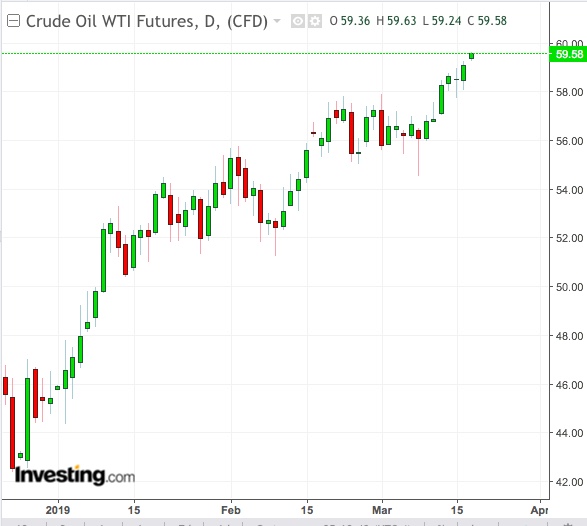Saudi Arabia gives the impression that the alliance of 24 oil producers it leads with Russia will be ruthless in carrying out deep production cuts over the next three months, and the market bought the portrayal by pushing U.S. crude up to just short of $60 per barrel. While Riyadh’s intent to drain the market of excess oil is clear, its decision to cancel OPEC’s April meeting suggests a desire to hide any feet-dragging by the rest of the cartel over the cuts.
Saudi Energy Minister Khalid al-Falih told a news conference in the Azerbaijan city of Baku yesterday that global oil supplies were still plentiful and production cuts may have to continue till the end of the first half—and as such, it made sense for the 15-member OPEC group to stick to a later meeting scheduled in June and skip the one next month.
Falih’s Russian counterpart Alexander Novak, also in Baku to review the impact of their output cuts since January under the OPEC+ alliance, which includes another ten countries outside the cartel, agreed. Novak also promised Russia would step up cuts in the coming months after his Saudi colleague remarked that Riyadh alone couldn’t carry the excess burden.

But while Falih said he was speaking for the rest of OPEC in canceling the April meeting, there was no assurance from others in the group that they were willing to bear the pain of more cuts over the next three months—particularly when crude prices were already up 30% on the year and U.S. oil was becoming a major competition to them in Asia.
Riyadh Not Taking Chances
The Saudis can silence much dissent within OPEC with their position as the cartel’s de-facto leader. Yet Falih seemed to be taking no chances in risking any mixed or muddled messaging coming out of the group a month from now, when global demand for oil is expected to remain subdued with major economies on the decline, and any lack of adherence to cuts on OPEC’s part could immediately hurt crude prices.
In a note issued Monday, energy consultancy Petromatrix called the scrapping of the April meeting “an unusual step”, particularly when Riyadh was setting a remarkable example of over-compliance with the OPEC plan to cut 1.2 million barrels per day. The Saudis are reportedly planning a production of under 7 million bpd in April, which compares with a typical monthly output of 10 million bpd or more last year.
The Zug, Switzerland-based consultancy, said:
“Saudi Arabia had indicated enough times that the cuts need to be extended. There is however no need to cancel a meeting to give that indication.”
But Petromatrix added that if there wasn’t enough commitment from other OPEC members to do more, “then it is maybe better to cancel the meeting rather than being trapped in inaction”.
It also speculated that some within OPEC might want to see how the U.S. plays its sanctions game over Iranian crude this time, before committing to deeper and lengthier production cuts.
Trump Might Still Surprise OPEC
Indeed, the entire oil market upheaval of 2018 was sparked by the surprise waivers issued by U.S. President Donald Trump to importers of Iranian crude, after he coaxed OPEC+ into ending an earlier round of production cuts on grounds that the market was undersupplied.
The Trump administration has been making noise about getting tougher with OPEC member Iran this time but there’s no telling what it would do, given the president’s need for low oil prices. The U.S. also holds the levers to oil exports from another major OPEC producer, Venezuela, also through sanctions.
Moreover, there’s the question of how much longer OPEC can continue with deep production cuts and earn less for its oil, despite the relatively higher prices for crude now compared with the lows seen during last year’s tumble.
Saudis Earn Less From Oil Now Despite Higher Prices
Simple math shows that Saudi Arabia’s record production of 11 million bpd in November would have potentially earned it around $22 billion, based on the Brent crude average of $66.50 per barrel then. If the Saudis produce less than 7 million bpd in April, and if Brent stays at its current price of $67, they would earn under $14 billion. That would hardly do for a Kingdom estimated to need an output of 10 million barrels each day and Brent at at least $80 for its budget.
John Kilduff, founding partner at New York energy hedge fund Again Capital, said:
“The ultimate end of the road will be when the Saudis realize the only way to fix this is to crash the market and become the last man standing in terms of being the lowest-cost producer.”
That was precisely the threat that United Arab Emirates Oil Minister Suhail al-Mazrouei issued to bankers at a Houston energy conference last week: If the U.S. tries to sue OPEC for market manipulation, the cartel would retaliate by overproducing and crashing oil prices, destroying the shale drillers funded by those banks.
But Petromatrix said it was OPEC that might be in trouble if the U.S. decided to call its bluff on overproduction, citing Exxon Mobil (NYSE:XOM)’s $15 per-barrel cost target in the shale basins as a factor that should be alarming to the cartel’s members, who thought only they had such low costs.
Petromatrix added:
“Due to their budgetary constraints, OPEC countries have shown that they have a lower survival rate than U.S. producers at very low prices.”
Goldman Sachs and JP Morgan wrote in separates notes on Monday that unless OPEC+ continues to over-comply with production cuts, supplies could build again in the second half of 2019.
JP Morgan said:
“Hence, we think OPEC+ cuts will need to be extended not just to the end of 2019 but also into 2020, if they want to avoid another oil price crash.”
